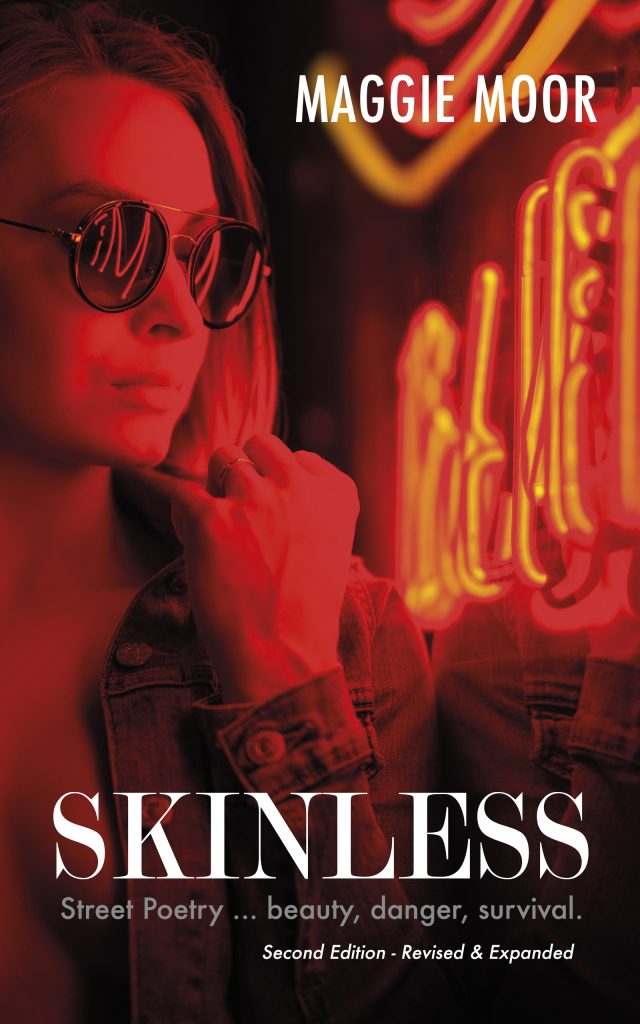SKINLESS, Second Edition- Inside

SKINLESS - THE BOOK
Beauty. Danger. Survival.
Skinless is a literary psychological thriller told entirely in Charmay’s raw first‑person voice.
Across two turbulent years—slipping from past to present—in the city’s underground, three forces converge: producer Eddie Cruise hears fire in her voice and pushes her raw; Sam Black—the Miami‑raised son of Cuban exiles—earns her trust, but his vendetta against a privileged partner draws danger; Rex Raven—a Wall Street financier who wants Cindy, not Charmay—opens glittering doors—and traps. Family ties pick old wounds. Hustles collide. Masks switch places. Chaos ricochets. Beats. Bullets. Bedsheets.
By the final chorus, Charmay must decide: cling to the mask that kept her alive—or claim the voice that could set her free. Honest, tense, and compassionate, Skinless is a psychological portrait of a woman fighting to overcome trauma’s scars—and learning that healing begins within. For readers of The Bell Jar, Just Kids, and literary noir.
“An eloquent crime novel… sentences vacillate between beauty and despair… Charmay’s raw will to live.” — Foreword Reviews, B. Welton
“Charmay is willing to be whatever she has to be to survive… wringing hope from the desire‑soaked streets of 1990s New York City.” — Clarion Reviews, D. Ballantyne
“Lyrical… with the grit of Jim Carroll.” — Goodreads review, D.H.
Skinless players. . .

CHARMAY
Passion for music; trauma-haunted; wrestling with alter ego.
From the book: “Me. Cool air; tawny skin. Long dancer’s limbs, lanky legs. Naked on my back. Gold chestnut waves; my hollow eyes blindly, wide open staring into hue, blue.”

CINDY
Charmay’s “seductive alter ego:” Cindy.
From the book: “But my mom named me after Cinderella. . .” Cindy eeked. That was a new story I had concocted. . .

SAM BLACK
Charmay’s confidant, lover. Miami-raised son of Cuban exiles; brings trust and danger. Big dreams caught in vendetta against Jesse.

EDDIE CRUISE
Famous Music Producer. Introverted, intense. Pushes Charmay to her guts.

JESSE
Sam’s business partner. Naive, addict. Rock drummer. Wealthy son of a State Judge. Introduces Charmay to Eddie Cruise.

REX RAVEN
Cindy’s Wall Street financier. Depressed divorcèe. Obsessed. Offers doors- and traps.
Skinless world. . .
A Lynchian current runs through everything—haunting, colorful, illusory, darkly comic. . .
Across two years slipping between past and present in New York’s underground, we see it through Charmay—our velvet‑voiced, street‑smart, trauma‑bruised singer who, by night, becomes Cindy. Three forces keep the pressure on: producer Eddie Cruise hears fire and pushes her voice raw; Sam Black earns her trust even as danger gathers; and Rex Raven opens glittering doors—and traps. Between gigs and after‑hours sessions, Charmay chases Eddie for a record deal.
Surrounding her is a family out of true: parents who unsteady her; Wanda, five years ahead, aloof; Aidan, two years behind, at the crux of the storm. Hart, the uncompromising vocal coach, pulls her toward the mic until the truth shows through. In Sam’s orbit, Eric—a recent law grad itching to go into business—stirs the pot. Comic detours arrive via Doctor Ski, Sam’s psychologist who meets the couple once, and Doctor Doggie, the dog‑obsessed referral who sends Charmay sideways. Down in Miami, Sam’s Cuban‑American family—his parents and sister Barbie—spin a fun‑loving visit that barely hides the fractures. And Sam’s vendetta zeroes in on Jesse—a well‑educated son of a state judge, newly addicted as he chases a rock‑drummer dream, naive as a deer—putting their cash side hustle on a knife‑edge as his loyalty comes into question.
The city adds its chorus. At Lucky Strike, Rex Raven and his trio of associates hold questionable court while a pop singer and a little wicked man slip between sets. In a Tribeca loft, Director O., a power filmmaker, works the room to woo Charmay as Eric’s friends whirl through—and after the party, the NYPD pays a visit. At Hudson’s, Felp presides, Max the vampiric maître-d’ deadpans, Frank hits his cues, and a jazz singer scores the night. Elsewhere, at Darling’s Gentleman’s Club—where Cindy takes shape—Gil, ever loyal, offers dad‑like counsel; at Chanel, where Rex suits Cindy up, an associate fashions her armor; and at Fortunoff’s, Stringbean, the comic diamond rep, performs a sales routine to seal the deal for Rex and Cindy.
Across town, Sam and Charmay explore La Trapeze—a crisscross club of hidden fantasy—while the Morgan Hotel homes the late‑night Sam‑and‑Jesse scheme. A penthouse suite at the Peninsula glitters above it all; underground Brownies steams in the small hours. After hours at Nightingales, the East Village haunt, Hart pushes Charmay to the raw as Skinny on guitar and Bleu on bass lay down a pulse that follows her home, Jesse’s wide‑eyed college friends crowding the tables.
And through it all, family moves like silent snipers; Charmay muscles through her father’s abandonment as the inner voices swell. Woven through that chorus is a reflective voice—steady, lucid—speaking from the other side now, threading hope through the noise. But back in the story present, Charmay runs from Skinless toward Cindy for solace; in the desperate hours, she writes songs on New York City streets, fleeing surfacing shadows—figures from the past and Skinless flashbacks, PTSD flares that render her formless—tilting the present into a waking nightmare.
Yet that reflective line keeps time, offering spiritual ground born of metaphysical and hard‑earned experience. In the end, the click of Charmay’s heels on New York City pavement becomes the pickup into the next song.
Skinless is an X‑ray of survival and artistry—urgent, unfiltered—offering a raw look at trauma, resilience, and how we adapt to survive; how we find light at the darkest edges of our minds and the city streets, along the fault lines of race and class—for readers who love literary noir and psychological thrillers with a hard‑boiled edge.
Skinless songs. . .
Others’ Words. . .
“Skinless is a revelation. Skinless is also a revolution—of survival. In a word, Skinless is a stunner.”
“I have read 25 novels per year for the past 40 years, more or less. I never wrote a review until now. One type of novel I seek out are author’s first novels. So, I dove into Maggie Moor’s first novel with an open mind and limited expectations – but by the end of the prologue, I had to pause.
“Whoa, this does not feel like a first novel, who the heck is Maggie Moor?”— Google “Maggie Moor” and you uncover an actress, a Jazz Singer, an elite Fitness model competitor and a licensed psychoanalyst working with people who have been traumatized or addicted. Then it dawns on you, the author of this book is all four of those people plus, now, an author. Best I can tell, this is not sequential, Ms. Moor is living all of these lives simultaneously.
OK. That helped. This is no typical first time novelist. Back to the book.
Within the first few pages, the reader instinctively understands that this book is crafted like “The Catcher in the Rye” and “The Bell Jar” in the sense that we realize that the main character is narrating their own story. Neither Salinger, or Plath or Maggie Moor overtly tells the reader that the “voice” telling their story has arrived somewhere on the other side of the plot that is about to unfold but the reader grasps this right away.
Ms. Moor has taken this technique to a much more intense place than I have ever experienced before as a reader. Whereas Holden Caulfield and Esther Greenwood are recalling a chaotic time in their life with a single voice that benefits from time and reflection; Charmay in “Skinless” is showing us all of the voices inside her head and using sentences that are jumpy and twisting and convoluted in the way that our minds work in real time.
Charmay’s “narration” is raw and instant and complicated. Salinger and Plath give us wonderfully crafted sentences. Ms. Moor gives us chaotic, broken sentences that have no benefit of reflection she gives us a real internal voice and Ms. Moor is relentlessly consistent about this until the epilogue.
Did you ever wish you could read the mind of a beautiful and complicated woman in real time while you were in the room with her? Hah! Be careful what you wish for because Maggie Moor makes that wish come true.
This is a thrilling and realistic story about living on the edge in New York City in the 1990’s told by an obviously intelligent, obviously gorgeous protagonist who is otherwise a victim of mental and physical abuse that got dumped into the streets with only her wits to survive and she is very busy doing just that – surviving amidst the chaos of the streets and the chaos in her mind.
Charmay has invented “Cindy” who is a successful stripper at those high-end gentleman’s clubs that sprang to life all over NYC in the 1990’s. It’s a great story with compelling characters but I did not write my first review ever because of that.
I wrote this review because this story is told entirely from inside the mind of Charmay, crafted in the moment, thinking and reacting in real time, using multiple voices (not personalities, except for Cindy, just voices) that comprise her very complicated personality and character. This is a writing exercise that would intimidate an author writing their 10th novel but Ms. Moor has pulled off this legerdemain gracefully, compassionately and compellingly. That’s why serious readers need to read this novel.”
